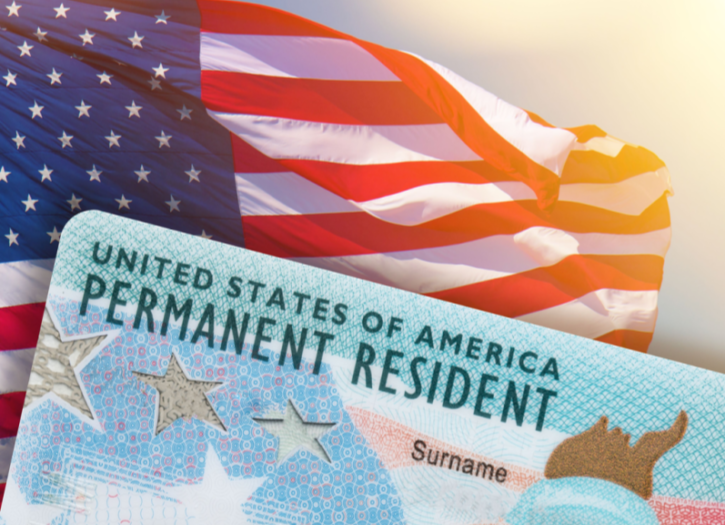Getting a green card is an exciting and life-changing achievement for a lot of people. It’s not easy to get your green card, and you can lose it. For example, you can lose your green card if you travel outside of the U.S. for too long.
There’s a lot to know about the process and laws surrounding green cards, which we detail below.
What Is a Green Card?
A green card holder is someone who’s a permanent resident of the U.S.
When you have a green card, you’re authorized to both life and work in the U.S. on a permanent basis. To prove that status, U.S. Citizenship and Immigration Services (USCIS) grants you a permanent resident card, a.ka. your green card.
You can become a permanent resident in different ways, including sponsorship by an employer or family member, individual filing, or refugee status.
A green card is technically known as the Permanent Residence Card.
The green card is a wallet-sized ID card that shows your lawful permanent residence.
You aren’t handed a card as soon as you’re approved for permanent residence. If you come to the U.S. from overseas, you enter with an immigrant visa. Then you get a temporary I-551 stamp on your passport.
If you adjust your status in the U.S., you get a letter of approval during or after your interview.
In any case, your actual green card arrives by mail, usually a few weeks later.
What Rights Come with a Green Card?
When you have a so-called green card, you have the legal right to live and work permanently in the U.S., as long as you uphold certain terms. You can apply for a lot of government jobs with a green card, although some are only reserved for citizens. You may also receive other educational and health-related benefits.
If you have a foreign-born spouse and unmarried children, you can petition for them to receive their green cards.
They are classified as preference relatives, so they may have to wait because there are annual limits on these visas.
You can keep your citizenship with your native country and then apply for U.S. citizenship later on.
The waiting period for most green card holders to apply for citizenship is five years, but if you were married to and living with a U.S. citizen the whole time, you only have to wait for three years.
There are limitations to a green card as well. You can lose status if you commit a crime or violate a law, or don’t advise the USCIS of a change in address.
There are grounds for deportability that are outlined in Section 237 of the Immigration and Nationality Act.
A green card holder who leaves the country and tries to return can also be subject to even broader grounds of inadmissibility. If you spend six months or more not in the U.S., this becomes a problem. It can also be problematic if you commit a crime while you’re overseas.
You are also limited in other ways as a green card holder. You can’t vote, nor do you have a high priority to sponsor other family members. You can’t run for political office, and you don’t receive a U.S. passport. Your green card also has to be renewed every ten years.
As a green card holder, you’re required to file income tax returns and report your income to the IRS and the tax authorities in the state you live. You have to obey all U.S. laws, and male green card holders between the ages of 18 and 25 are required to register for the Selective Service.
You have to carry your green card with you at all times.
Reasons You Can Lose Your Green Card
As was touched on above, you can lose your green card and permanent resident status, and the following are some of the more common ways this happens:
- Residing outside of the U.S.: If you live outside the U.S. for more than 12 months, you might lose permanent resident status. If you have a shorter absence, you can also go through deportation. When you re-enter the U.S. after a period of absence, it may be up to you to convince Customs and Border Protection officers you intend to stay in the U.S. If you’re planning to leave the country for a significant period of time, you should get a re-entry permit before you leave.
- Voluntary surrender of a green card: If you fill out Form I-407, you start the voluntary process of surrendering your green card, most often done to avoid paying U.S. taxes.
- Willful misrepresentation or fraud: If you use any illegal method to get U.S. naturalization and immigration benefits, you can lose your status. Evidence of possible fraud can lead to the ending of green card status and immediate deportation. Marriage fraud is one of the most often seen types of fraud that immigration officials report. For example, there are mail-order marriages, or someone might pay a U.S. citizen to marry them.
- Crimes: If you’re convicted of certain crimes, or you use or sell illegal substances, you may be deported.
- Failure to remove conditions: If you don’t remove conditions of residence, you can be deported at the expiration of a two-year green card. This is true for foreign nationals who obtain residence through marriage. When you marry a U.S. citizen, you receive a two-year conditional green card. Then, for permanent residency, you have to file a petition to remove the conditionality. You have to file the document within 90 days of receiving a conditional green card, or the card expires and can’t be renewed.
- Becoming a citizen: Everything above is negative, but you can also lose permanent residence status when you become a citizen. Once you’re a naturalized U.S. citizen, you’re protected from deportation.
Green Card Eligibility Categories
There are several types of green cards you can apply for.
The processing time is anywhere from 7 to 56 months, depending on the type you apply for and where you’re applying from.
If you’re applying for an adjustment of your status, the wait is usually 21 to 38 months.
- If you’re a close relative of a U.S. citizen or a current green card holder, you can apply for a family-based green card. Family members include spouses and children and parents and siblings. This category also includes widows and widowers who were married to U.S. citizens at the time they died.
- Employment-based green cards include many subcategories of workers who can apply for permanent residence. Their spouses and children qualify in some cases too. One example is a priority worker, which is EB-1. These are workers in fields that require extraordinary abilities. There are programs for physicians who agree to work in underserved areas for a certain period of time, and there are also categories for professionals with advanced degrees. Then, there are programs for skilled and unskilled, and professional workers.
- Humanitarian green cards are for refugees and people seeking asylum. Once someone comes to the U.S. and lives for at least a year after receiving refugee status or asylum, they can apply for a green card.
- The Diversity Visa Lottery Program is when the government selects up to 50,000 people annually from a pool of entries from six regions around the world. Only people from countries that have previously had little immigration to the U.S. in the past can enter. The share of green cards that go to any one country is limited to 7%.
- If someone has lived in the U.S. for a long period of time, legally or illegally, they can apply for a longtime residence green card.
Green Card vs. Citizenship
When you have citizenship, you have benefits that a green card holder doesn’t.
If you want to immigrate to the U.S., lawful permanent residence is typically the first step. That means you fit into a category for a green card, and when you apply for residence.
After getting a green card, you usually have to wait five years before you take the next step, which is when you become a citizen. This is the naturalization process.
You can get U.S. citizenship through birth in the U.S., birth overseas with a U.S. parent, or living with a parent as a child when your parent naturalizes. Other than these scenarios, the only way you can move straight from no immigration status to being a U.S. citizen is by joining the military in the U.S.
If you go through the process to get citizenship, you can’t be deported, although your citizenship can be revoked if you committed fraud when you applied.
You receive an identity document, and you can qualify for a passport with few exceptions.
If you’re a citizen, you can vote in U.S. elections, and you can petition family members to apply with a timeline that’s usually faster.
Whenever possible, it’s usually best for permanent residents to apply for citizenship as soon as they can to reduce the risks of having to leave the country and enjoy the full benefits of being American.







Add Comment
You must be logged in to post a comment.